There are some films you see for the first time that give you that “wow” feeling; for me seeing Star Wars in a theater in smalltown, Wisconsin was one of those films. But there are other films that leave you with a different kind of feeling, one that leaves you in a state of emotional stupefaction. For me one of those films was Sidney Lumet’s 1964 Hays Code-breaking The Pawnbroker. When I was in college I read something about it, and since the campus library’s audio-visual department had in its VHS collection, I requested it and was assigned a desk with a TV monitor and waited for someone to load the tape. Two hours later I left the library feeling traumatized.
The Pawnbroker, based on a short novel by Edward Lewis Wallant, was an early Hollywood attempt to unmask the psychological effects of the Holocaust on the survivors. Many, probably most, recovered enough to continue the semblance of a normal life; but a few were wracked by “survivor’s guilt,” especially those who were the only surviving members of their family. Numb to the world around them, their effort to “survive” by blocking out all memory of the past also meant being insensitive to the problems and feelings of others. Yet even when such people seek human companionship, their problems are beyond what a person with ordinary experiences can do to help.
The pawnbroker, Sol Nazerman (Rod Steiger), is such a person. We first see him as a younger man, a university professor, and he is picnicking with his family. They seem to be having a carefree day, and Nazerman is playing with his children:
But then he sees something. What is it? We can infer what it is long before the film actually does shows us:
Next we see him lounging in the backyard of a tract house in a sterile, lily-white subdivision. Bertha, the sister of his wife Ruth and whose family he now lives with, is bugging him about paying for a trip to Europe; after all, it’s his money that they are living on, so he should at least have a say in it:
Bertha notes the coming 25th “anniversary” of something concerning her sister, something sad that had occurred. She further annoys Nazerman about her quaint idea about Europe; he tells her that all he remembers about it was its “stink”:
We then see Nazerman driving and parking his car in a much different environment, East (Spanish) Harlem, where most of the residents appear to be Afro-Latinos, mainly Puerto Rican:
Here he arrives at the pawnshop he operates for a local Mr. Big:
Then we see Jesus (Jaime Sanchez) asking his mother to only speak English. He has “big plans” about his future, legally:
We now see the daily routine of Nazerman. Here is a typical exchange with a customer: he brings in a perfectly useless “award” which he claims to be made of gold.
Nazerman only gives him a dollar for it, because it is only gold leaf:
Jesus—his assistant—shows up late but Nazerman doesn’t seem to care, nor does he show any interest in Jesus’ plans to “clean up” the place, such as rearranging the clothing by size:
Then a “regular,” Mr. Smith (Juano Hernandez), arrives to engage in “intellectual” conversation about some philosophical work he has been reading, but Nazerman ignores him and just wants to know what trinket he has to pawn as an excuse for this visit:
Nazerman then receives a phone call from Mr. Big for whom he runs the shop for, Rodriguez (Brock Peters)—who apparently is wealthy enough to have a Nordic-looking manservant:
Nazerman is to expect one of his henchman, Savarese, to bring a check for him to sign in exchange for an envelope of cash in an apparent money-laundering operation, although Nazerman seems to be deliberately unmindful of this. After this conversation he receives a visit from someone new to the neighborhood:
This is Marilyn (Geraldine Fitzgerald), and she runs a nearby community center. She is visiting all the local businesses and seeking their assistance in donations and maybe even sponsoring a team, like for basketball; she must be joking, he tells her:
However Nazerman does write out a check for her. After she leaves Jesus asks him to
teach him the business, which he doesn't respond to,
but they are interrupted by the arrival of a group of Jesus' former “friends,” led by Tangee (Raymond St. Jacques). They have brought in a brand new lawnmower that was obviously stolen, which they of course deny. Nazerman gives them $30 for it just to get them out of the shop:
Jesus notes the numbers tattooed on Nazerman’s arm, he asks him if it is for a “club,” and what he has to do to join; Nazerman tells him he has to learn to “walk on water.”
Jesus finally persuades Nazerman to show him the tricks of the trade, here being shown how to determine if something is a precious metal or not:
Class is interrupted when Savarese turns up. Nazerman hands him a check, and Savarese gives him and envelope which he says contains $5,000. Jesus watches with interest as the money is put in a safe.
It is night, and Nazerman walks to his car, past the fence where beyond is several people beating on someone:
We then see that the scene has jogged something from the past in Nazerman’s memory:
Next we see Jesus is in some swank club with his prostitute girlfriend, and she is none too happy about the presence of his criminal former friends—especially when after he is needled working for “peanuts,” he inadvertently admits that Nazerman has $5,000 in his safe.
Next we see Nazerman visiting Tess, the wife of his friend Ruben who died at Auschwitz (apparently the man seen trying to escape), telling her to close the door on her father Mendel, who has been bothering Nazerman with his insults about him being dead to the world; Tess says that he will never forgive them for sleeping together, because to him she is still Ruben’s wife:
When Jesus seems to be tempted about stealing the money in pawnshop safe, his girlfriend tries to dissuade him by telling him she can earn extra money from “private sessions” prostituting that the “boss” won’t know about:
At the pawnshop, Jesus expresses concern about Nazerman’s more morose than usual behavior, but is told to go find something to do:
Then as Marilyn looks on, another customer is trying to fob off a rather old radio that supposedly can even pick signals from “outer space.” Unfortunately it won’t pick up anything:
Marilyn wants to apologize for being “tactless” before, although Nazerman doesn’t seem overly concerned about it. She invites him to have lunch in the park; he thinks she is joking to want to have lunch with someone as indifferent as he is.
Then another customer comes in, a rather frail young woman who is pregnant. She wants to pawn her diamond engagement ring (she has obviously been abandoned by the father), but Nazerman informs her it is worth nothing because it is glass:
It jolts another memory of the past, as Nazi guards remove rings from the prisoners:
Before leaving, Marilyn persuades him to join her for lunch on Wednesday or Thursday, although it is not clear he actually “hears” her. After she leaves. Jesus wants to continue the lessons; Nazerman says he will teach him about money. He tells him how Jews without a homeland of their own were forced to become merchants and engage in usury in their segregated communities, and (becoming louder and angrier as he goes on) stereotyped as money-grubbers with secret resources, and eventually as “kikes”:
Shocked by Nazerman’s speech, Jesus returns to home, and promises his mother he will be a “good boy”:
Nazerman visits Tess again, this time facing Mendel, who refuses to take the medicine offered him. He wonders if any blood flows through Nazerman’s veins, can he feel any pain, passion, love or pity. He is deader than those who actually died in Auschwitz; he is the “walking dead.”
Nazerman is at the park when Marilyn arrives. Has he forgotten about their lunch appointment? Yes, and he isn’t interested in keeping it:
She sits by him and offers him a sandwich, but he won’t take it. She tells him that she “understands” how he feels; she also feels “excruciating loneliness”:
Of course this annoys Nazerman because in his mind her "problem" is nowhere near the level of his. And it is not loneliness he feels, in fact he welcomes it and wishes she would leave him alone, underscoring his point by moving to another bench:
Of course her reaction to his seeming insensitivity before she walks away:
Back at the pawnshop, Savarese shows up again, but this time Nazerman is not in a cooperative mood, and refuses to sign the papers given him. This may be more a reaction to Savarese tearing away the calendar sheets from September 29, which apparently has some secret meaning to Nazerman:
Knowing this is trouble, Jesus wonders what is wrong with Nazerman; he says he “doesn’t know”—at least not yet:
Mr. Smith shows up again for intellectual conversation, but Nazerman shoos him off, which obviously pains Smith.
Jesus confronts Nazerman on his treatment of Mr. Smith; did he do it because he is black? Nazerman claims he wouldn’t care if he was black, white or yellow; he just doesn’t like anyone:
Surely he believes in God? No, Nazerman doesn’t believe in anything—not art, science or politics—except for money. Money is the “whole thing”:
Jesus, who idolized Nazerman before, sees his view of him crumble way. He leaves the shop and after first encountering his girlfriend who begs him not to anything foolish…
…he finds his crooked friends in a pool hall, and suggests to them he might be ready to stage a robbery of the safe:
Jesus’ girlfriend (wearing a wig) decides to see Nazerman, offering some trinkets to pawn:
Just then he receives a phone call from Tess, who tells him her father has died; he acknowledges the news but cannot feel anything about it and refuses to comfort her:
After the call, Jesus’ girlfriend tries to get more money out of Nazerman by exposing her breasts in a Hays Code-breaking scene, the first time in a major Hollywood studio release:
This jolts a memory from Nazerman about his deceased wife—again showing nudity from the front—in a room at Auschwitz, where she “services” Nazi officers:
After Nazerman has Jesus' girlfriend leave, this memory sparks some emotion inside him that this time he can barely contain:
Nazerman’s memory of his wife being used as a prostitute before dying in Auschwitz disturbs him so much he decides to pay a surprise visit to his boss, Rodriguez, who is flattered that the professor would deign to do so, given his usual company:
But Nazerman isn’t there to engage in intelligent discussion; he wants to know if Rodriguez also runs a prostitution racket:
Of course he does, among other questionable business ventures…
…Nazerman is a bigger fool than he thought if he doesn’t understand where his money is coming from, with the pawnshop spending more money than it takes in:
Nazerman, seemingly devastated by this revelation walks about the streets doing something that he hasn’t done in a long time—think:
And pays a visit to Marilyn, apparent for human company, and to talk:
But she still cannot cope with psychological issues in his own mind; she cannot help him:
As a last effort at some connection, she puts out her hand to him, but he will not reciprocate:
On the subway, Nazerman again sees faces that remind him of the past:
Desperate to escape these memories, instead he finds himself confronted with it:
It is his memory of the death of his son, who he had been holding on to in a train car crammed with other prisoners:
He wanders back the pawnshop in numb mood…
…and unlike his refusal to take Marilyn’s hand, he touches Jesus, perhaps the first time in a long time he has touched someone to suggest that he actually cared:
The man who had earlier pawned his award for poetry reciting and received a dollar for it returns with another award to pawn; this time Nazerman shocks him by paying him much more than it is worth:
While he now ignores and angers people who bring in obviously stolen items…
…he otherwise makes other customers happy by continuing to overpay for items of limited worth:
Nazerman obviously doesn’t care what he is doing now; Jesus, noting this, interferes with a sale allowing a woman to buy a piece of jewelry for two dollars when the list price is actually $12.50:
Jesus demands to know what is going on with Nazerman…
…but Nazerman responds viciously; he doesn’t care about anything anymore, and to him Jesus is nothing:
Jesus runs out of the store and seeks out his crooked friends, and they will rob the safe in the pawnshop:
Meanwhile, Rodriguez shows up and demands that Nazerman sign the papers that Savarese had brought earlier:
When he refuses, he is beaten. He tells Rodriguez that he has to kill him first, and the look on his face indicates that this is his wish:
Rodriguez, realizing that Nazerman wants him to kill him, tells him he will have him killed, but not at the time he wants to be:
After Rodriguez leaves, Nazeman remembers what had startled he and his family so many years ago:
Then Jesus and his friends arrive…
One of them threatens Nazerman with a gun unless he opens the safe…
…Nazerman bows his head; just shoot me, he seems to be saying:
But Jesus, who didn’t want Nazerman to be hurt, rushes forward to grab the gun…
… and is himself shot:
He crawls outside as a crowd gathers and an ambulance arrives…
His mother sees what has happened, and rushes out in agony for what she fears:
Nazerman, startled out of his self-involvement, rushes out to see Jesus…
…and realizing that someone has given his own life to save his, he lets out a silent scream of agony…
…and now he is no longer merely the victim of life; he now has blood on his own hands:
Nazerman goes back to the pawnshop, where he performs a symbolic act of crucifixion…
…and walks away, staring at the wound in his hand:
The Pawnbroker is a powerful film that greatly disturbs the senses as it was intended to do. Rod Steiger was nominated for an Oscar for his performance and this is certainly the best of his career, even more so than his Oscar-winning turn in In The Heat of the Night. It is rather surprising that a film that was so controversial and groundbreaking at the time of its release is not better appreciated than it is. Neither the original Republic Pictures DVD release, nor the Olive Films otherwise excellent transfer to Blu-ray includes any special features or audio commentary to discuss the film’s impact and importance. Watching it again, The Pawnbroker hasn’t lost any of its ability to shock one out of their reverie for the “joys” of every day existence, or to force one to understand the depths of despair one can go that is so deep that people with ordinary “problems” simply cannot comprehend it.
But as much as we want to sympathize with Nazerman, there is no escaping the fact that in ignoring the feelings of other people—or barely even acknowledging their existence—has repercussions. His relationship with his assistant, Jesus, remains relatively “stable” so long as Nazerman remains noncommittal and does not disturb Jesus’ fragile hold on a law-abiding existence; but when he tells Jesus he means nothing to him when confronted with his own apparent effort to deliberately run the pawnshop into the ground, this may simply mean that Nazerman doesn’t care about anything anymore and prefers to be physically as well as mentally dead to the world. But in Jesus’ mind, if Nazerman thinks he is no more than the steady stream of customers he brutalizes psychologically for lack of human decency and empathy for the conditions which brought them to the pawnshop in the first place, then his life also has no meaning beyond the acquiring of money, legally or not.
But because Jesus does not understand Nazerman anymore than Nazerman understands Jesus’ fragility, it leads to the tragedy that finally awakens Nazerman’s realization that being blind to the world around him and the feelings of those he is (forced) to interact with has consequences. He can function around people like Tess because in her own way she is “dead” too, or at least she empathizes with his deadness and accepts it. On the other hand, Marilyn is “lonely” and believes that Nazerman is a fellow traveler on that road and understand her. But he does not, or chooses not to; his aloneness is a different creature altogether. Marilyn wants companionship to assuage her loneliness, and Nazerman does not want anyone penetrating his aloneness. Life, it seems, only brings back the memories of the past he is trying to forget, because he cannot live with the fact that he alone survived. At the end, even in realizing what he has done, Nazerman walks alone; perhaps he will go see Marilyn or Tess and show the human warmth that he has denied the world—or perhaps not.











































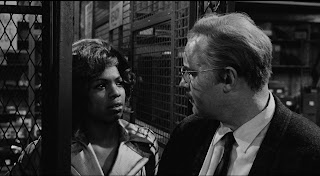



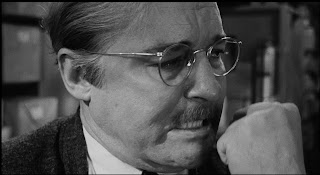










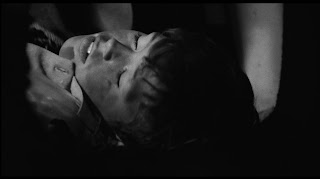





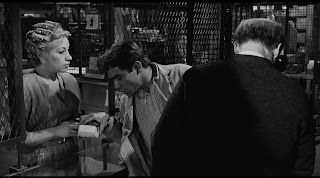














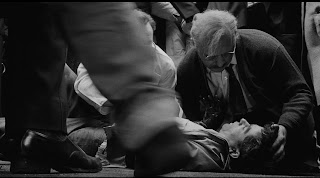




No comments:
Post a Comment